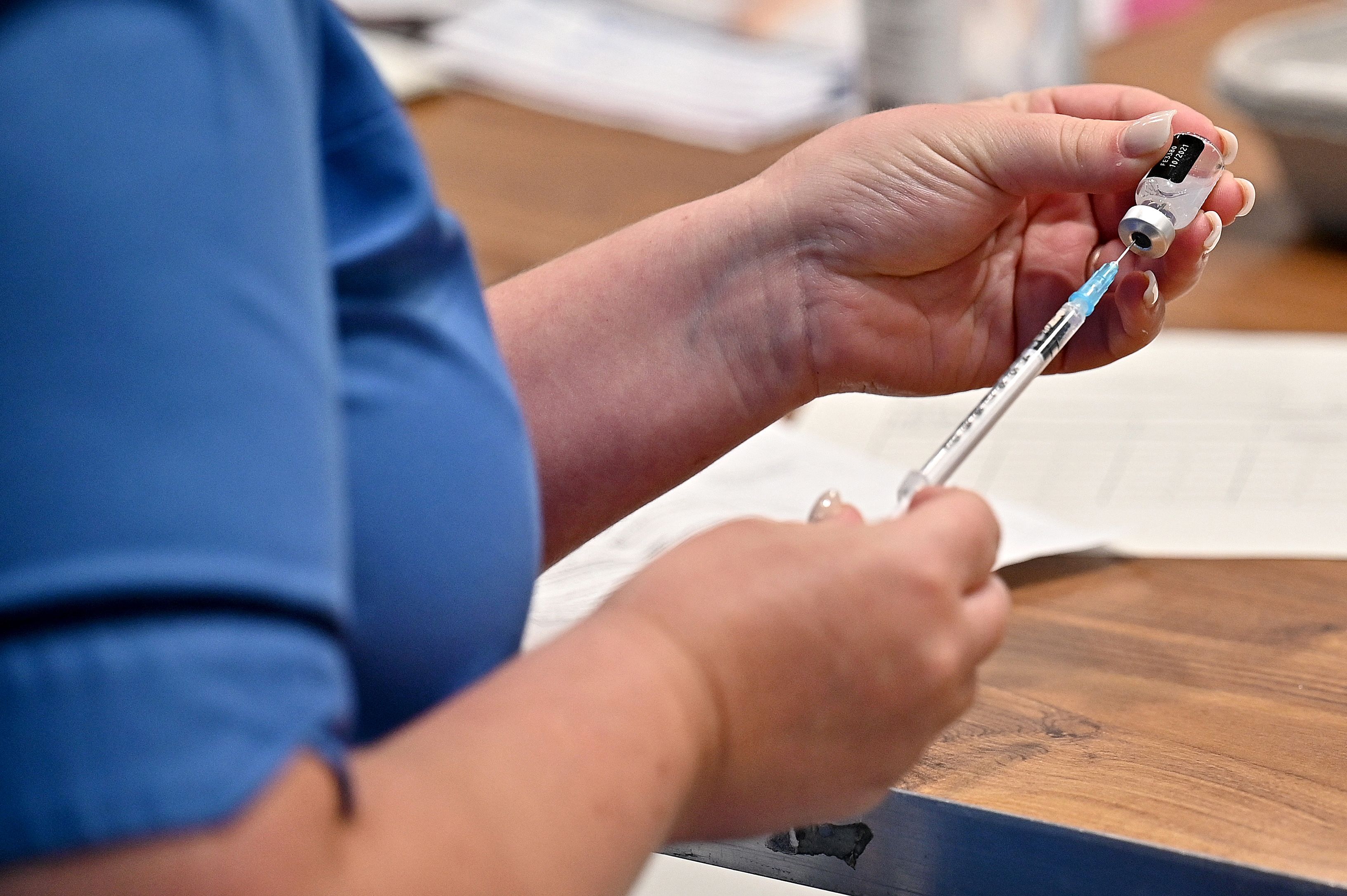British PM Johnson warns of tougher Covid-19 rules if cases surge
Sign up now: Get ST's newsletters delivered to your inbox

Britain's Joint Committee on Vaccination and Immunisation said its preference was that the Pfizer vaccine was used for the booster dose.
PHOTO: AFP
LONDON (BLOOMBERG, REUTERS) Boris Johnson warned he could bring back compulsory face masks, advise people to work from home and mandate the use of vaccine passports if a surge in Covid-19 cases this winter threatens to overwhelm the UK's National Health Service.
The British prime minister said he hopes a beefed-up vaccination program starting next week - including booster shots for the over-50s and vaccines for children as young as 12 - will be enough to keep the virus under control.
Under his winter plan published on Tuesday (Sept 14), the government will also roll out the UK's biggest-ever vaccination campaign against influenza - with free flu shots available to teenagers and all over-50s as well as vulnerable groups.
But in a televised Downing Street news conference, Johnson said further measures must be kept "in reserve" and that proof of vaccination in particular is "an important part of our repertoire".
Though daily Covid-19 infections remain relatively high - with 26,628 new cases reported on Tuesday - the government regards current pressure on the NHS as manageable and Johnson is keen to enter a new phase of the pandemic with more individual choice and freedom.
As part of this, the premier said he is considering "simplifying" the so-called traffic light rules for international travel and wants to make "the burdens of testing less onerous for those who are coming back into the country".
More details are expected to be announced before the end of the month.
The risk for Johnson is that he eases the rules just as the virus begins to surge again, putting pressure on a health service that is already struggling to cope with rising waiting lists for elective operations and treatment.
England's chief medical officer Chris Whitty, standing alongside Johnson, said that while Covid-19 cases had stabilised to "some extent," Britain is coming into the "most difficult part of the year".
The number of people in hospitals with the virus is "drifting up" and variable around the country, he said. "We are entering the winter with this reasonably high level and it wouldn't take many doubling times to get into trouble," Whitty warned.
Patrick Vallance, the government's chief scientific adviser, said the government must act quickly and strongly if the data goes the wrong way.
The ratio of cases to hospitalisations is seen as an important factor in deciding when to impose further measures.
Britain could bring back legislation to enforce national or regional lockdowns in England as a last resort, a person familiar with the matter said, adding this was not the intention.
The government earlier accepted the advice from its vaccine committee to go ahead with the Covid-19 vaccine boosters. The program will rely on shots from Pfizer and Moderna, both based on messenger RNA technology, and only offering the homegrown vaccine by AstraZeneca and the University of Oxford in cases where people can't have an mRNA vaccine.
Britain's plans are being closely watched globally.
Knowing that people can safely receive a third shot that's based on a different technology could give countries more flexibility in their efforts to widen vaccination coverage.
At the same time, Britain's move is likely to fuel the debate over boosters. Some countries are moving ahead with extra doses amid an increased threat from the Delta variant and studies suggesting waning antibody levels in vaccinated individuals.
Yet World Health Organization officials have urged governments to wait at least until the end of the year so that poorer countries get better access to vaccines, adding that the scientific evidence is insufficient.
The government estimates nine countries have already announced booster campaigns, with potentially 18 others considering such a step, Jonathan Van-Tam, deputy chief medical officer for England, said in a televised press conference.
The country understands the need to expand vaccine coverage globally, he said. "We get that," he said. "By the same token, the job given to us is to define what is best for the UK."
Separately, officials said Covid-19 vaccines had saved more than 112,000 lives and averted 24 million infections
Britain has recorded 134,000 Covid-19 deaths among its 67 million people.
Health minister Sajid Javid said the booster programme would start next week and he expected vaccinations for health workers to become compulsory.
The four nations of the United Kingdom will all pursue a booster campaign as recommended by the Joint Committee on Vaccination and Immunisation (JCVI).
The JCVI proposed the booster be given six months after a second shot, after evidence of a small decline in vaccine effectiveness against hospitalisation in older people from a little over 90 per cent to a little under 90 per cent over 5-6 months.
Officials said protection from two doses of vaccine beyond 6 months was uncertain and that boosters would prevent illness and deaths from Covid-19 over the winter, but did not say whether the extra shots would lower transmission rates.
"We're not past the pandemic. We know this winter could quite possibly be bumpy at times...It's better to be pre-emptive and to be prepared and plan for the worst," England's Deputy Chief Medical Officer Jonathan Van-Tam told reporters.
So far 44 million people have had two vaccine doses, 81 per cent of those aged over 16. On Monday, the government said those aged 12 to 15 would also be offered shots.
Britain is currently recording the second highest number of new infections after the United States, which also plans booster shots.


